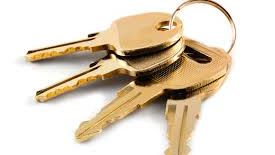Tenant Lockouts
Hand Over The Keys

The most important thing to know is that a Lockout is not an eviction. If a landlord changes the locks and has not gotten an eviction order from the court, they must give the tenant a new key.
No matter what the lease says, even if the landlord is closing down the premises, the landlord CANNOT remove a door, window, lock, doorknob, or any other appliance furnished by the landlord because of past-due rent unless the removal is for repair or replacement (in which case, a lock, doorknob, or door should be fixed or replaced before nightfall)
The landlord can ONLY lock a tenant out of their residence for the following reasons (no matter what the lease says) :
- Tenants are late in paying any part of the rent, even if they made a partial payment.
- Necessary because of an emergency or for construction or repairs.
- The tenant has abandoned the dwelling.
- Read the lease. Although there is no clear definition, “abandonment,” it is based upon the tenant's intent, not the landlord's desires. If the rent is current, the property can not be labeled abandoned, even if no one stays there.
- If the rent is past due, the tenant hasn’t occupied the dwelling for five (5) consecutive days, and most of the belongings are gone; they run the risk of being locked out. If moving, they should move out all at once or keep their landlord informed if they intend to return to finish moving.
- Remember, even if the lockout was proper the tenant is entitled to a key.
If the apartment complex receives tax credits (a federal subsidy), the landlord can not lock anyone out except for emergency, repairs, or necessary construction. If the person is in the military and their rent is under $1,200 per month, the landlord can’t lock you out without court permission.
If the lockout is for nonpayment of rent, tenants are entitled to:
- Advance written notice stating the earliest day the locks will be changed, the amount of rent owed, and where to pay late rent during regular business hours.
- If the notice is delivered (or left inside the front door), they have at least three (3) calendar days before the landlord can change the locks. For a mailed notice, they have at least five (5) days. The landlord can’t change the locks on a day immediately before a day the office will be closed.
- For example, if the office is always closed on Sunday, they can’t legally be locked out on a Saturday.
- The tenants have the right to recover immediate possession of their dwelling. The landlord must post a written notice on the front door stating: how much rent is owed and where they can pick up a key (day or night) or a 24-hour telephone number to have the key delivered within two hours.
- The landlord must give the tenant a key, even if the rent is still not paid. The tenant should not leave the property before getting the key.
The landlord will not hand over the key, what now?
- Tenants are entitled to get a writ of reentry from the justice court to go back home.
- The landlord could be liable for one month’s rent plus $500, actual damages, court costs, and attorney’s fees. If the landlord didn’t provide a key, the landlord could be liable for the above plus another month’s rent. The court will subtract any unpaid rent from any money received.
- The landlord can request a hearing on the lockout within eight (8) days after you gain re-entry. The hearing will be held within a week after the landlord requests a hearing.
- Make sure the landlord has failed to follow the correct lockout procedure before getting a writ of reentry. Otherwise, the landlord could sue for damages, rent, attorney’s fees, and court costs.
- NOTE: Even if the lockout was improper, a tenant could still face eviction for nonpayment of rent.
Belinda J. Martinez/Staff Attorney/Lone Star Legal Aid